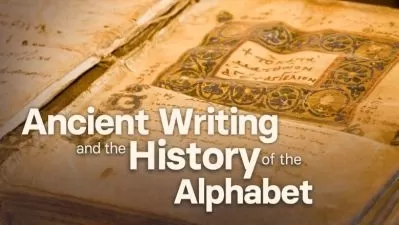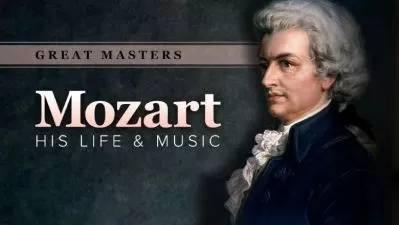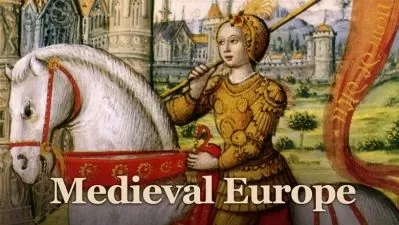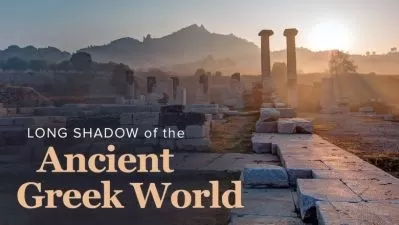Gnosticism: From Nag Hammadi to the Gospel of Judas
David Brakke
12:58:05
Description
The three centuries following the death of Jesus were a momentous and turbulent era in Western religious thought. During this time, as Christianity began its massive ascent, distancing itself from paganism and Judaism, other important currents of religious belief appeared, in what became an epoch of intense theological conflict and debate.
In this age of burgeoning faith, few if any influences on the theological landscape were as significant or far-reaching as the religious movements known to us as Gnosticism. Gnosticism, one of the most fascinating and perplexing phenomena in Western religious history, intersected deeply with early Christian thought, sparking religious ideologies that competed with the theological thinking that came to define Christianity. And, though Gnosticism was eventually branded as heretical by the emerging orthodox church, the church formed many of its most central doctrines in response to Gnostic ideas.
But what was Gnosticism? Why did its ideas and mythology appeal to so many people? How did it influence other faiths, including Judaism, Christianity and Islam?And why did Christianity— while showing clear signs of Gnostic influence—condemn it?
This course takes on these provocative questions and more, in a narrative that unfolds as an enthralling religious detective story—penetrating the mysteries of a stigmatized yet profoundly important legacy of religious thought. Among many intriguing features of the story, you’ll learn that:
- What we call “Gnosticism” comprises a number of related religious ideologies and movements, all of which sought “gnosis,” or immediate, direct, and intimate knowledge of God;
- Gnostic groups reinterpreted and often rewrote Jewish and Christian scriptures, creating religious mythologies that struck deep chords in contemporary seekers;
- Gnostic thought and practice reveal to us the precursors of the mystical tradition within Christianity.
Throughout its existence, Gnosticism maintained a continuing, contentious dialogue with Christian thought. Ultimately, such core Christian concepts as original sin, the immaculate conception, and heresy developed in response to Gnosticism. To study the history and theology of Gnosticism is to gain a deeply revealing view into how canonical Christianity developed as it did, and to comprehend some highly influential alternative religious paths in the West—the paths of gnosis.
In Gnosticism: From Nag Hammadi to the Gospel of Judas, Professor David Brakke of The Ohio State University is your guide in a richly detailed immersion in the theology, sacred writings, rituals, and outstanding human figures of the Gnostic movements. At the heart of the story is the 1945 discovery of the Nag Hammadi codices, a mysterious cache of ancient documents unearthed in the Egyptian desert, that gave us firsthand accounts of the Gnostics’ beliefs, practices, and ways of life. Studying these invaluable texts, along with more recent discoveries, such as the astonishing Gospel of Judas and Gospel According to Mary, gives you a profound look at Gnostic spirituality and its singular impact on religious history.
While fully respectful of traditional Christian beliefs, this course provides a valuable perspective on the development of Western religions and Christian theology.
Discover the Core of Gnostic Belief and Practice
In the opening section of the course, you’ll explore two of the primary spiritual paths in the Gnostic tradition. First, you’ll devote a full six lectures to the Gnostic School of Thought, a religious movement that spread throughout the ancient Mediterranean world. By studying essential Gnostic texts such as The Secret Book According to John, the Revelation of Adam, and The Reality of the Rulers, you’ll penetrate the elaborate Gnostic religious myth, conceiving of God as a highly complex divine intellect consisting of numerous dimensions known as “aeons.”
Among many striking features of Gnostic theology, you’ll find that:
- The Gnostics believed that the God of Genesis was a lesser, imperfect divine being, but not the ultimate God.
- Gnostic thought contends that Jesus saves, not by dying for our sins, but by revealing to us our true origin in the spiritual Entirety.
- Gnostic scriptures were not unchangeable, and were often modified over time: religious myth was simply a means to the ultimate end of gnosis.
- Gnostic texts describe two ways of knowing God directly; one, by a spiritual journey through the heavens, the other by contemplation of one’s own intellect—believed to be a miniature version of the Entirety, or God’s mind.
Next, you’ll study the most famous of the Nag Hammadi texts, themystical Gospel According to Thomas, a variant on Gnostic thought that teaches that the kingdom of God is not a future event, but is already present, hidden within each of us.
The following lectures devote careful study to the Valentinians, who turned the Gnostic myth into a powerful Christian movement that lasted for centuries. Within these lectures you’ll learn how the theologian Valentinus reformulated Gnostic mythology in ways that appealed powerfully to Christians, and you’ll grasp the remarkable Valentinian vision of salvation—as a healing of the separation between our divided “male” and “female” selves.
Explore Alternate Western Paths to Divinity
As the course progresses, you’ll investigate other important early paths of gnosis, both Christian and non-Christian, which further illuminate the theological conceptions and influence of the Gnostics:
- The “Orthodox” Gnostics: Learn about the seminal work of Christian theologians Clement and Origen, who, while intensely opposed to both the Gnostics and the Valentinians, claimed to offer a path to gnosis of God which was consistent with the teachings of the emerging church.
- The Hermeticists: Grasp the theology of Hermeticism, based in religious wisdom of ancient Egypt and Greece, which taught a philosophical and mystical pathway to the divine.
- The Neo-Platonists: Encounter the Neo-Platonist teaching of Plotinus, whose theology focused on our essential union with “The One” and divine gnosis through contemplation.
- The Manichaeans: Study the highly dualistic mythology of this religion, explore its path to salvation through restraint and moral purity, and learn how St. Augustine developed his teaching on original sin in opposition to Manichaean ideas.
Across the span of the lectures, you’ll observe how and why gnosis-based theology deeply alarmed proto-orthodox Christians, and how their concerns ultimately gave rise to the concept of heresy.
A Riveting and Highly Illuminating Inquiry
A religious scholar of extraordinary knowledge and insight, Professor Brakke brings the Gnostics’ story alive with the style of a master storyteller, using visual aids to demystify complex mythology in an accessible yet deep and comprehensive presentation. Following Gnostic ideology through the centuries, he vividly illustrates its impact on Western thought, from its role in early religions and its re-emergence in medieval spirituality to its remarkable traces in modern popular culture, from science fiction writing to Hollywood films.
In delving into the paths of gnosis, you’ll discover a compelling, alternative current of religious practice in the West, which challenged proto-orthodox Christianity, profoundly affecting its development. In the resulting crucible of theological debate, you’ll see clearly how orthodox Christianity differentiated itself from these paths, and how Gnostic influence continued to affect Western spirituality in ways that resonate to the present day. Join us in a penetrating look at a heretical yet historically significant tradition of religious thought.
More details
User Reviews
Rating
David Brakke
Instructor's CoursesProfessor David Brakke is the Joe R. Engle Chair in the History of Christianity and Professor of History at The Ohio State University. He received his B.A. in English from the University of Virginia, his M.Div. from Harvard Divinity School, and his Ph.D. in Religious Studies from Yale University. He taught for 19 years in the Department of Religious Studies at Indiana University.
Professor Brakke has published extensively on the history and literature of ancient Christianity, especially Egyptian Christianity, early monasticism, the formation of the biblical canon, and Gnosticism. His books include The Gnostics: Myth, Ritual, and Diversity in Early Christianity; Demons and the Making of the Monk: Spiritual Combat in Early Christianity; and Introduction to Christianity, with Mary Jo Weaver. He has co-edited six volumes of scholarly essays and contributed nearly 40 articles to professional journals and volumes. From 2005 to 2015, he served as editor of the Journal of Early Christian Studies.
At Indiana University, Professor Brakke received recognition for his teaching and research, including the Outstanding Junior Faculty Award. He has held several important fellowships, including ones from the National Endowment for the Humanities and the Alexander von Humboldt Foundation. He is currently preparing a revised edition of Bentley Layton’s The Gnostic Scriptures.

The Great Courses
View courses The Great Courses- language english
- Training sessions 24
- duration 12:58:05
- English subtitles has
- Release Date 2023/06/06

















